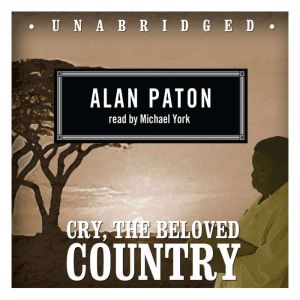

Cry, the Beloved Country
Author: Alan Paton, Charles Scribner
Narrator: Michael York
Unabridged: 9 hr 48 min
Format: Digital Audiobook Download
Publisher: Blackstone Publishing
Published: 05/01/2008
Categories: Fiction, Literary Fiction, Classic


Author: Alan Paton, Charles Scribner
Narrator: Michael York
Unabridged: 9 hr 48 min
Format: Digital Audiobook Download
Publisher: Blackstone Publishing
Published: 05/01/2008
Categories: Fiction, Literary Fiction, Classic
Alan Paton (1903–1988), South African novelist and humanitarian worker, was born in 1903 in Pietermaritzburg in the province of Natal, South Africa. After attending Pietermaritzburg College and Natal University, he taught school for three years in the rural village of Ixopo, the setting for Cry, the Beloved Country.
Michael York, an acclaimed actor, has appeared in such films as Romeo and Juliet, Cabaret, Wide Sargasso Sea, and Austin Powers, as well as on the London and Broadway stages.
Alan Paton - image from The South African - photo by Terence Spencer This is a classic, written by a white South African about a time before apartheid. Two fathers, one white, one black and their sons. It is stylistically unusual. Quotes are not used, for example. Conversation is indicated by leading......more
This isn't an infinitely quotable book, but occasionally it produces a line that is devastatingly clear and true. Lines like, "It was not his habit to dwell on what could have been, but what could never be." and, “It is the duty of a judge to do justice, but it is only the people who can be just.” m......more
Though not published until early in 1948 (and the events leading to its submission for publication, which the author describes in the Author's Note at the beginning, were rather unusual) Cry the Beloved Country was written in late 1946, and is set in the author's present. It's fair to say that it's......more
I am a teacher and, after 34 years, attempt to find new combinations in the catalogue of "must reads." I have done this as a staple for years. Last year, when deciding what I wanted to do - kind of like window shopping for lovely clothes -- I decided to read this book after reading Hamlet. I love th......more
I cant say enough about this book. It is lyrically written, reads almost like an epic out of Ireland. The dialog between characters is straightforward, and the book manages to give you a glimpse of Apartheid S. Africa, from the richest people, to the poor urban laborers, to the criminals, to the pea......more
“A beautiful novel, rich, firm, and moving…its writing is so fresh, its projection of character so immediate and full, its events so compelling and its understanding so compassionate that to read the book is to share intimately, even to the point of catharsis, in the grave human experience treated.” New York Times
“One of the best novels of our time.” New Republic
“The marvelous British actor Michael York brings the white South Africans, with their idealism, their prejudices, and their own provinciality, vividly to life. His native African characters, perhaps inevitably, sound more Anglo than tribal, but it makes small difference. With the haunting, incantatory rhythms of its language and the human complexity of its story, this is a polished, elegant production of a true classic.” AudioFile
“This great classic…still remains relevant today for providing understanding of how the mining business destroyed native families and the African tribal system—resulting in urban migration, poverty and crime still with us today. Despite many heartbreaking events, the story ends on a hopeful note. Actor York creates fully voiced characters—young, old, male and female—that enhance this important work and make it a spellbinding tale.” Kliatt
“With a deep yet gentle voice rounded out by his English accent, Michael York captures the tone and energy of this novel. His rhythmic narration proves hypnotizing. From the fierce love of Kumalo to the persuasive rhetoric of Kumalo’s brother and the solemn regret of Absalom, York injects soul into characters tempered by their socioeconomic status as black South Africans.” Publishers Weekly